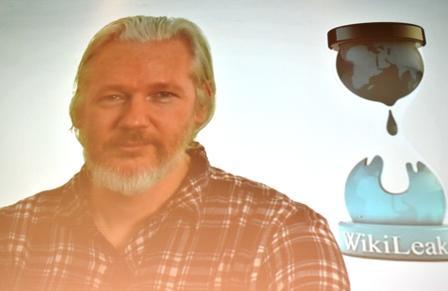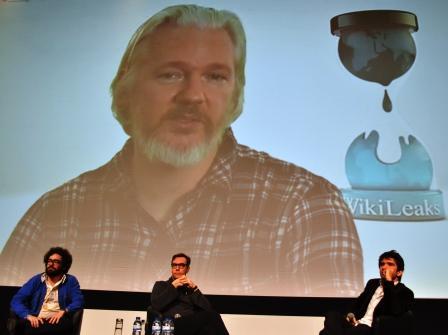WikiLeaks founder Julian Assange, streaming live over a webcam, alerted an international audience gathered here at the Lisbon-Estoril film festival in Portugal to the danger of feeling fear in a world of surveillance. Powerful agencies establish their authority through the "use of fear," he told us, and "all it takes to use fear is to create the perception of fear."
He argued that we should resist that fear.
"If you tell people that they are being watched by powerful agencies, they start to self-censor, even when SSMing their wife. We have to look back at people working with the Stasi to see how people understood their own oppression. We have to establish consciousness about surveillance oppression--as well as the consciousness to not become paralyzed as a result of our consciousness. We cannot consider ourselves as surveilled cogs in a political machine. It is not the place of human beings to think they are in Terry Gilliam's Brazil! Even if they are in that culture, they must realize that this is not fit for human beings, and they must change that reality."
He spoke in an easy, eloquent manner, his face large on a movie screen, as he outlined the process of the production of fear, and why not to give it credence. "It is important for [secretive organizations] to present themselves as potent. And this makes people unreasonably scared."
This fear is "unreasonable," he argued--in an evident strategy to boost the confidence of his audience--because "we who care" about issues such as human rights are more potent and capable than those who do not.
"Secret organizations are not places where the best and the brightest shine. When they go head to head with organizations where the people [do have passion and intelligence] they lose. These are organizations run by bureaucracies, and bureaucracies are incompetent."
His primary example: General Keith Alexander, former NSA chief, who now has become a military contractor. Not because of "his business expertise" in running companies (of which he has none, Assange stated), but because of his personal contacts: "the built-in incompetency of secrecy."
As for victories over secret bureaucracies, Assange cited his own, the case of WikiLeaks, as well as the case of Edward Snowden.
"WikiLeaks has gone head to head with the Pentagon. We were asked to give back the materials seized. They were not successful at all with a single document. Similarly, with the recent Snowden affair--which was a clear match between the NSA and us and other supporters--the question was whether he was going to get asylum or whether the US was going to put him a prison. The result of conflict is that the US government lost."
My question for Assange was about his own relationship to "freedom and rights," the two words he repeated as goals in democracy. It is quite uncanny to receive words of encouragement to be fearless from a tranquil face looming on a large screen, with the awareness that the actual speaker, unlike the audience, is unable to physically leave the room of the webcam.
To summarize his situation: Assange has been constrained to living quarters in the London Ecuadorian Embassy for the past two and a half years, because of fear of extradition to Sweden for what was initially a sexual assault charge, but which subsequently devolved into a charge (not yet confirmed) that the activist did not use condoms during consensual sex, on two separate occasions, with two Swedish women who hosted him in their homes. The reason he chooses to stay trapped in asylum, rather than face the no-condom charge in Sweden--which (if established) carries a sentence not much longer than the one he is already voluntarily serving (four years maximum)--is that once in Sweden, according to one of his pro-bono lawyers, Jennifer Robinson, also here at the film festival, he would "be surely extradited" to the United States where he would be "prosecuted for his actions as a publisher."
These actions as a publisher (i.e., the leaking of classified government material), in the view of Assange's critics, irresponsibly put US security and private individuals at risk: hence Assange's controversial reputation (for some, he is a hero; for others, a criminal) and the risk of extradition to the United States to face charges.
"But they have yet to come up with a single charge," Robinson stated, her eyes flashing with anger. "Not one! Julian was very careful to not publish any article that put US security in danger. For Julian, the point is that a journalist must be able to protect their sources."
In the meantime, Assange remains indefinitely in the reconverted women's bathroom of the Embassy where--according to Jacob Appelbaum, an activist hacker and supporter of the WikiLeaks founder, present in the audience--he is "not allowed to look out a window" or "go near a door."
As others remarked in the conference: Assange has visibly aged from his tenure indoors.
How does Assange continue to work--with fearless optimism--in this highly scrutinized (and surveilled), window-deprived and legally inchoate existence?
"Human beings are very adaptable to the difficult situations they find themselves in," he responded, with a smile--albeit a smile more vulnerable than at the outset. "The adaptability is a cause for a real concern," he continued, shifting the discourse, once more, from the personal to the political.
"Are we slowly being cooked like frogs in a boiling pot? I have been detained for the last four years; this is the new normal for me. It is a similar situation for many people: see Chelsea Manning who has been unjustly sentenced for 35 years in prison for communicating with the press."
As for the question of how he continues with his work--with his bank accounts closed (including blocks on PayPal and all credit cards) and every visitor scrutinized--he responded with easy confidence:
"In my case, surveillance is personal. I was put on the NSA manhunting list. 15,000 dollars a day are being spent on surveilling me here in the Embassy. But my case is not the case of anybody. I have the luxury of having a lot of experience in cryptology and knowing how to deal with surveillance. I have training. [The most concrete thing I can say] is that I know how to confuse the opponent, and how to spend effort on what is truly important."
He also joked that being in the Embassy had its advantages. "I can't be raided; it is a place without a state. The English police and the Ecuadorian police are not allowed to enter. It is an anarchic environment, between states. It is a very interesting situation being in a stateless region."
The audience here in Estoril--which included European parliamentary member Anna Gomes, musician Arto Lindsay and activist-hacker Jérémie Zimmermann--was visibly moved by Assange's calm delivery.
"Your smile shows inner joy of someone who knows that he is doing something that is right to do," interjected Zimmerman, speaking back to the screen.
Assange smiled.
However, a member of the audience--who introduced herself as "concerned citizent"--confessed to Assange that, despite his encouraging words to the contrary, she was personally affected by the culture of fear, as she did not have the expertise of a cryptologist. "Someone gave me a smart phone, and I immediately gave it to my son. I don't want to be a target for advertisers."
"I don't fault the advertisers too much," Assange said sanguinely.
Rather, Google received the brunt of his censure.
"Google is very connected with the US State Department; it has become the number one spender, as a company, as a lobby, more than Apple. It is very ambitious. It wants to suck up each person into its mesh; understand where every person is, what they are doing. Of course it says that it wants this in order to better target. But its basic model is the same as that of the NSA: to collect as much information about everyone, and provide a predictive model of each person--and this supposedly for advertising."
For those who wanted to know more on this subject, Assange suggested reading his piece: "WikiLeaks: Google is Not What It seems."
"You can even Google for it," he laughed.
Throughout this discussion of Google, Assange spoke in a measured calm voice, always with a hint of a smile.
He reserved his most heated words for the average citizen who refuses to reflect on privacy rights:
"Google is the greatest intelligence coup that has ever happened at all in the world. And people have voluntarily entered into that system. Now the basic argument people say [to defend the invasion of privacy] is 'I am not an important person. I personally have nothing to hide.'"
His voice raised in irony:
"My question back is: what's wrong with you that you have nothing to hide? You must be an incredibly boring person. What are you contributing to society? PLEASE immediately go and get something to hide!"
The audience--clearly in agreement with this assessment--burst into laughter.
Assange continued:
"Everyone is being targeted in mass surveillance. Somebody is reporting about you on Facebook, or using Gmail: they are being informants on you, on their husbands, on their wives. That is the reality. There is no ability for anyone to escape arbitrary injustice; it does not matter if you are boring, if you have kept a clean nose! Lightning can strike anyone when you have a system of arbitrary injustice."
If there is "no escape from arbitrary injustice", as Assange states, then how--one might wonder--is it possible to resist fear?
Some answers were suggested by Assange's supporters, omnipresent at the festival. All week at the Lisbon-Estoril film festival--in an unusual sideline to the films-- there were symposia on how to respond to surveillance, bringing together intellectuals such as Columbia University law professor Eben Moglen, French writer Eric Sadin, Spanish judge Baltasar Garzon and Portuguese former European Parliament member Rui Tavares. One common theme among these speakers was that the internet is not the problem: technology can be resisted with other technology, such as, the most often noted solution, free software and cryptology.
Assange's solution was the same. Use technology to fight technology.
"We have to find other mechanisms: decentralized technologies, states within a state..."
His voice became somber.
"If not," he said--his smile gone. "We will have a globalized situation with very few power centers and we will inevitably end up in a digitalized totalitarian world."
His face disappeared from the screen.


